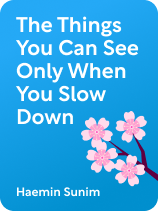

This article is an excerpt from the Shortform book guide to "The Things You Can See Only When You Slow Down" by Haemin Sunim. Shortform has the world's best summaries and analyses of books you should be reading.
Like this article? Sign up for a free trial here.
Why does it feel like we’re always busy? How can you slow down in a fast-paced world?
In Zen Buddhist teacher Haemin Sunim’s book, The Things You Can See Only When You Slow Down, he explains why people today feel overwhelmed by busyness. If you want to feel less busy, you need to change your perspective and stop blaming society.
Here’s Sunim’s advice for slowing down in a fast-paced society.
Why Do We Feel So Busy All the Time?
Today, the sensation of being always busy has become a common complaint. Haemin suggests that this feeling of busyness and restlessness are not objective truths, but a reflection on our state of mind: He argues that the world itself is not inherently busy but that the chaos of our minds makes it feel busy. The more cluttered our minds are, the more chaotic our world seems. Therefore, according to Haemin, the key to experiencing calmness and tranquility lies in calming your mind rather than trying to control the world around you.
(Shortform note: In a culture that often equates busyness with success and self-worth, calming one’s mind can be particularly challenging. While Haemin focuses on controlling mental chaos, Brigid Schulte takes a different approach in her book Overwhelmed. Schulte emphasizes managing time effectively and setting clear boundaries between work and personal life to minimize feelings of busyness. Furthermore, she advocates for embracing leisure without guilt or fear of being unproductive, challenging the notion that busyness equates to worthiness.)
What Is the Value of Slowing Down?
Haemin argues that if you want to feel less busy, you need to intentionally slow down, which means living in the present moment. In doing so, he explains, you’re better able to observe, understand, and appreciate what you might otherwise overlook in the rush of daily commitments and challenges.
For example, consider a routine activity like commuting. Typically, when you commute, you’re focused on reaching the destination quickly (future thinking), leading to potential frustration or stress when you hit traffic or have to stop for gas. This mindset can result in overlooking details of the experience that could offer value or enjoyment.
By applying Haemin’s advice to slow down, the experience of the same commute changes. Taking the time to observe your surroundings, like noticing the way light filters through trees or observing the people around you, allows for a richer experience of the same journey. Slowing down not only changes what we notice but also affects our internal state, often leading to a more relaxed and positive mindset.
| Slowing Down Around the World The deliberate practice of slowing down is seen in cultural philosophies around the world, underscoring a universal longing for deeper connections and contentment in life. Each of these philosophies, though rooted in a distinct culture, converges on the principle that true fulfillment arises not from relentless busyness but from appreciating the present moment and the simple joys it offers. For example, Italy’s “La Dolce Far Niente” (“the sweetness of doing nothing”) teaches us the art of finding pleasure in idleness, a reminder that sometimes doing nothing is the most productive thing we can do for our souls. It challenges the notion that our worth is tied to how much we achieve, advocating instead for the richness found in life’s tranquil moments. Similarly, Denmark’s “Hygge” introduces us to the comfort of coziness and the happiness that comes from creating a warm, inviting environment where relationships flourish. It emphasizes that well-being is built on the foundations of simplicity and togetherness, rather than material possessions. Finally, Costa Rica’s “Pura Vida” (“pure life”) embodies a holistic approach to life, celebrating its beauty, simplicity, and the pure joy of living. It encourages people to slow down and appreciate what they have, fostering an attitude of gratitude and contentment. |

———End of Preview———
Like what you just read? Read the rest of the world's best book summary and analysis of Haemin Sunim's "The Things You Can See Only When You Slow Down" at Shortform.
Here's what you'll find in our full The Things You Can See Only When You Slow Down summary:
- Why we feel continuously busy and overwhelmed
- How embracing slowness can lead to increased self-awareness and contentment
- The importance of curbing your enthusiasm when pursuing your passion






